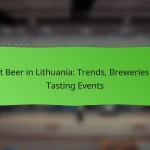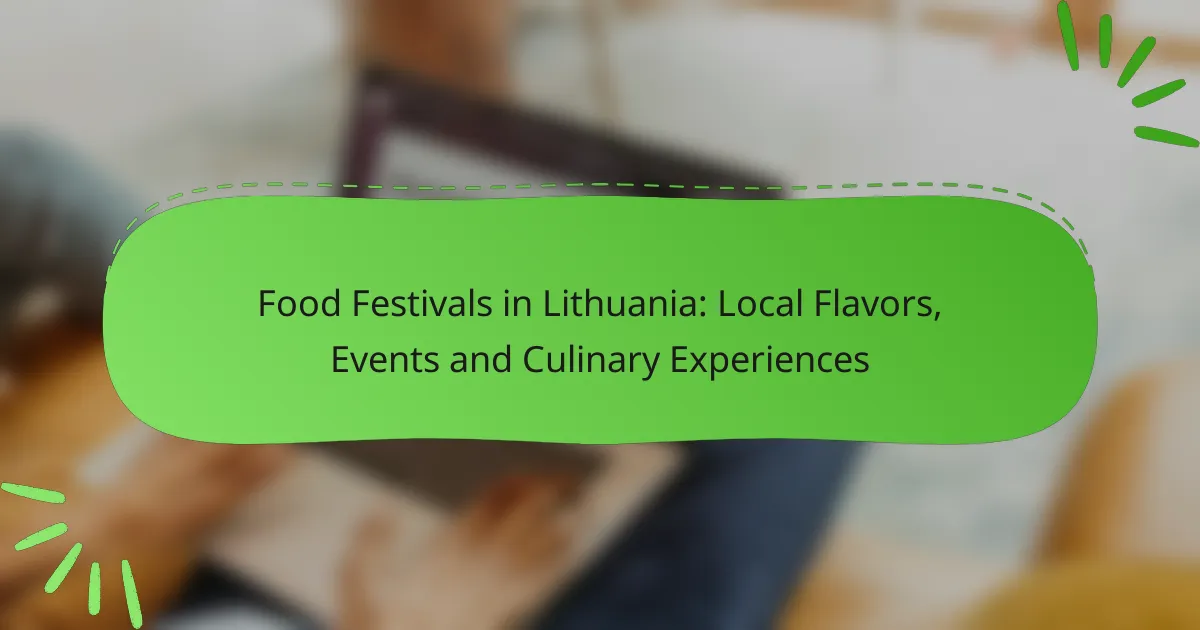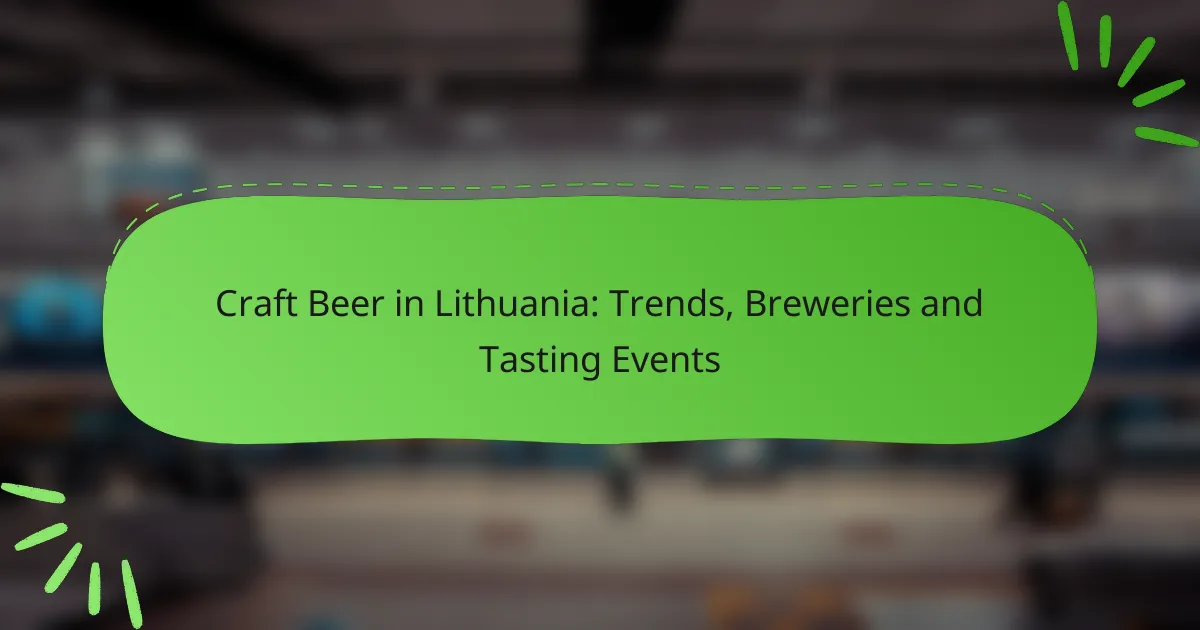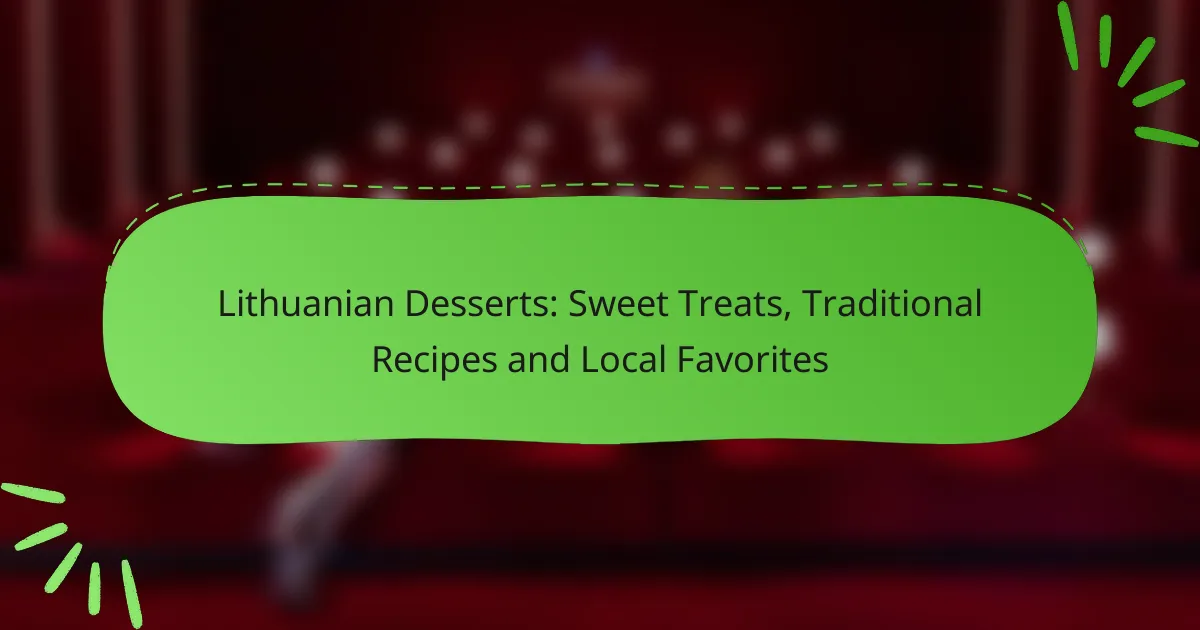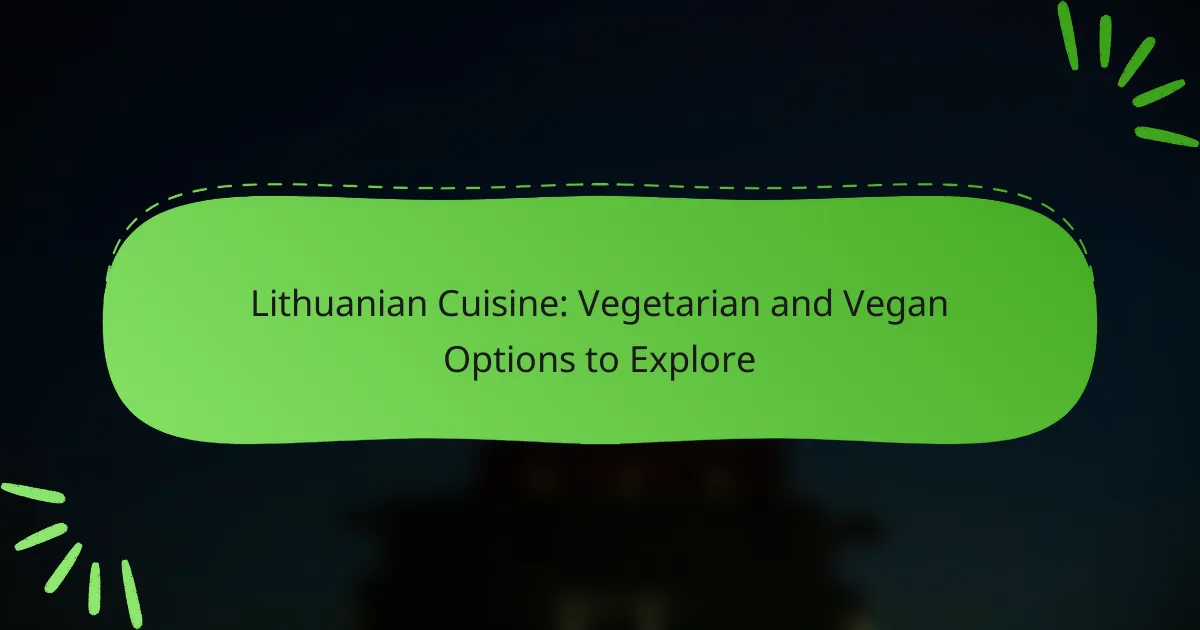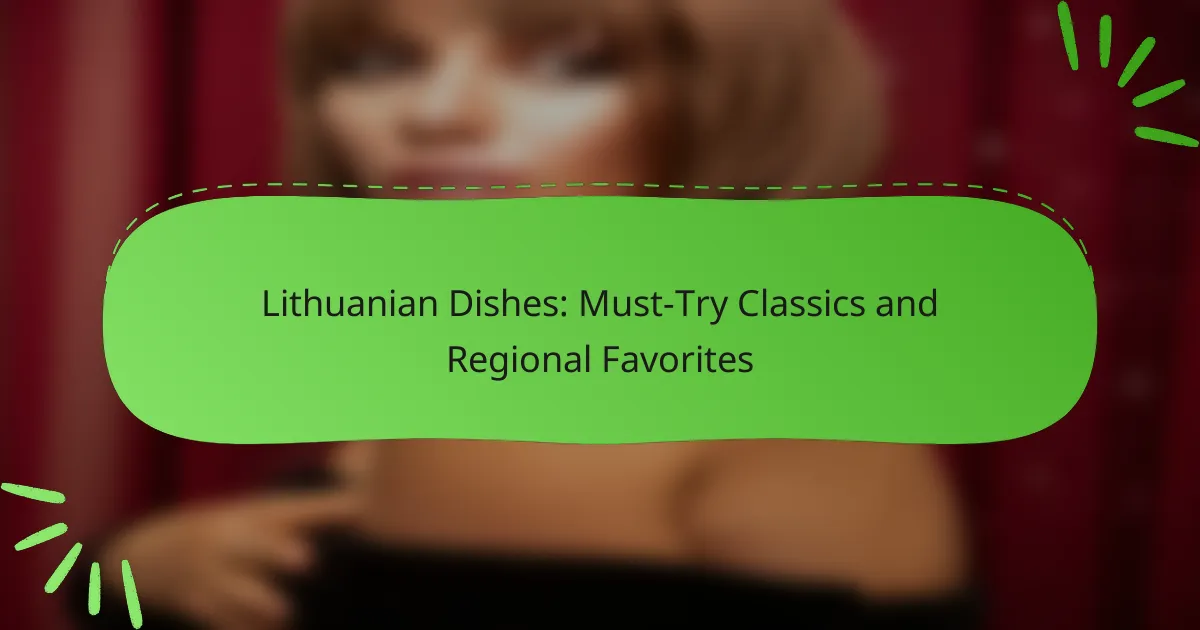Food festivals in Lithuania offer a delightful exploration of the country’s rich culinary heritage, featuring traditional dishes crafted from locally sourced ingredients. These vibrant events not only celebrate authentic flavors but also immerse visitors in the cultural activities that define Lithuania’s unique gastronomic landscape.
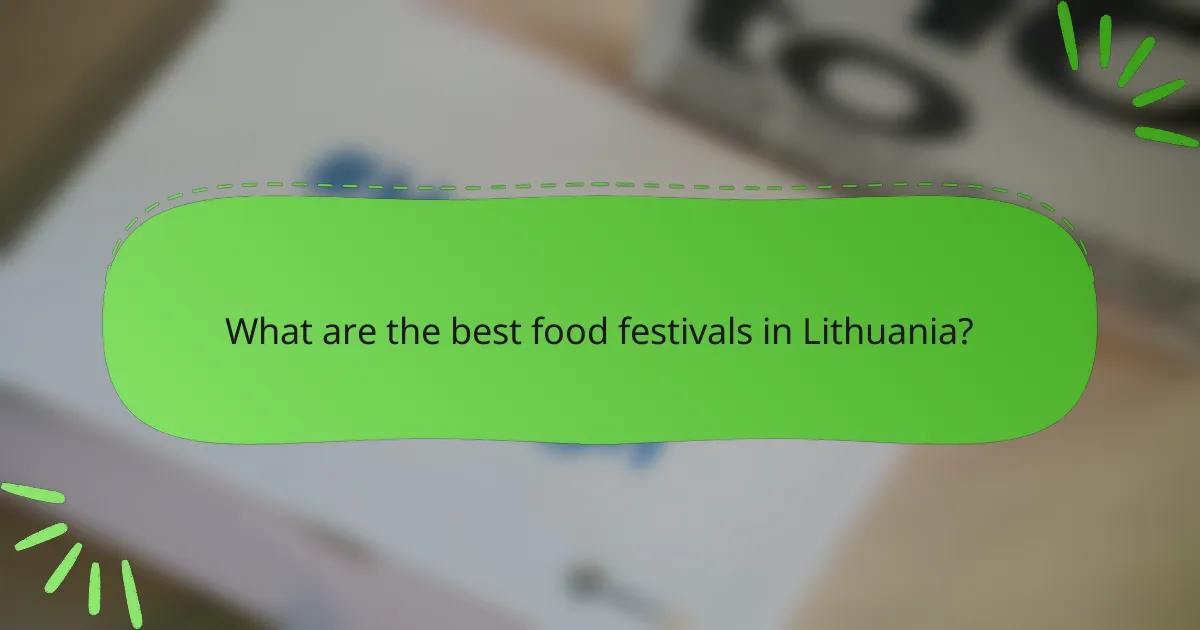
What are the best food festivals in Lithuania?
The best food festivals in Lithuania showcase the country’s diverse culinary heritage, featuring local ingredients and traditional dishes. These events provide an opportunity to experience authentic flavors while enjoying vibrant atmospheres and cultural activities.
Vilnius Street Food Festival
The Vilnius Street Food Festival is a popular event that celebrates the city’s vibrant street food scene. Held annually, it attracts food lovers who can sample a variety of dishes from local vendors, ranging from traditional Lithuanian fare to international cuisines.
Visitors can expect live music, cooking demonstrations, and workshops that enhance the culinary experience. It’s advisable to arrive early to avoid long lines and to make the most of the diverse offerings available.
Klaipeda Sea Festival
The Klaipeda Sea Festival is a unique celebration that combines maritime culture with delicious seafood. This festival typically features a wide array of fish dishes, local delicacies, and cooking competitions, making it a must-visit for seafood enthusiasts.
In addition to food, the festival includes various entertainment options such as concerts, art exhibitions, and nautical activities. Attendees should consider trying the local smoked fish, which is a highlight of the event.
Kaunas Food Festival
The Kaunas Food Festival showcases the culinary talents of local chefs and restaurants, offering a platform for innovative dishes and traditional recipes. This festival often includes tasting menus, food pairings, and workshops aimed at educating visitors about Lithuanian cuisine.
Food lovers should look out for special events that feature local wines and craft beers, enhancing the overall tasting experience. Engaging with chefs during demonstrations can provide valuable insights into the preparation of traditional dishes.
Šiauliai Culinary Festival
The Šiauliai Culinary Festival focuses on promoting local ingredients and traditional cooking methods. This event features a variety of food stalls, cooking contests, and tastings that highlight the region’s agricultural products.
Attendees can participate in hands-on workshops and learn about the significance of local flavors in Lithuanian cuisine. It’s a great opportunity to connect with local producers and gain a deeper appreciation for the food culture.
Panevėžys Beer Festival
The Panevėžys Beer Festival is dedicated to celebrating Lithuania’s rich brewing tradition, featuring a wide selection of local beers and food pairings. This festival attracts both beer aficionados and casual drinkers, offering tastings from various breweries.
In addition to beer sampling, the event includes food vendors that complement the brews, showcasing traditional snacks and dishes. Visitors should consider trying local favorites like dark rye bread and smoked meats, which pair well with the beers on offer.
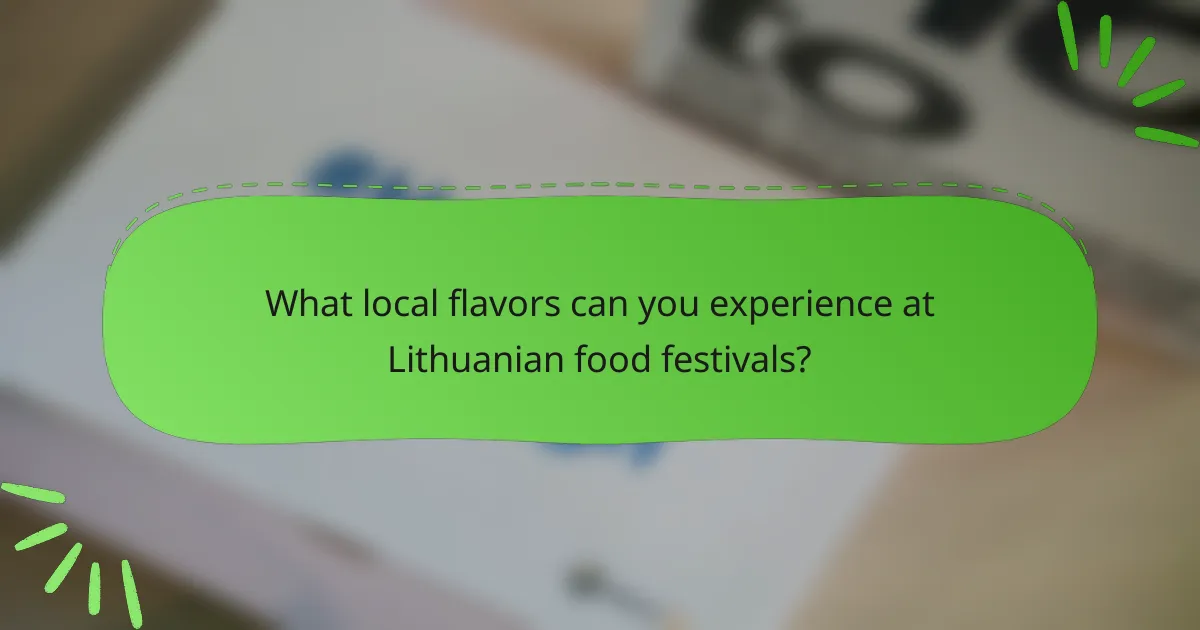
What local flavors can you experience at Lithuanian food festivals?
Lithuanian food festivals showcase a variety of local flavors that highlight the country’s rich culinary heritage. Visitors can expect to taste traditional dishes made from locally sourced ingredients, reflecting the unique agricultural practices and cultural influences of Lithuania.
Traditional Cepelinai dumplings
Cepelinai, often referred to as “Zeppelins,” are large potato dumplings typically filled with minced meat or curd. These hearty dumplings are a staple at food festivals and are usually served with a generous dollop of sour cream and crispy bacon bits. Their comforting texture and rich flavor make them a must-try for anyone attending a festival.
When enjoying Cepelinai, consider pairing them with a glass of local beer or kvass, a traditional fermented beverage. This combination enhances the overall experience and complements the dish’s flavors.
Šaltibarščiai cold beet soup
Šaltibarščiai is a vibrant cold beet soup that is particularly popular during the warmer months. Made with beets, cucumbers, dill, and buttermilk, this refreshing dish is often garnished with boiled eggs and served with potatoes on the side. Its striking pink color and tangy taste make it a visually appealing and delicious option at festivals.
This soup is not only flavorful but also nutritious, providing a good source of vitamins and minerals. Be sure to try it as a starter or light meal during your festival visit.
Rugelis rye bread
Rugelis, or rye bread, is a fundamental part of Lithuanian cuisine, known for its dense texture and earthy flavor. Often baked with a mix of whole grains, this bread pairs well with a variety of toppings, from local cheeses to cured meats. At food festivals, you can find freshly baked Rugelis that showcases the traditional baking methods passed down through generations.
When sampling Rugelis, consider trying it with a spread of butter or a slice of smoked fish for a truly authentic experience. Its robust flavor complements many Lithuanian dishes and enhances the overall meal.
Local cheeses and dairy products
Lithuanian food festivals feature a diverse array of local cheeses and dairy products, reflecting the country’s rich dairy farming tradition. From soft cheeses like fresh curd to aged varieties, these products are often made from cow, goat, or sheep milk. Many vendors offer tastings, allowing visitors to explore different flavors and textures.
When enjoying local cheeses, consider pairing them with fresh bread or seasonal fruits. This combination not only enhances the flavors but also provides a delightful contrast in textures, making your festival experience even more enjoyable.

How to choose the right food festival in Lithuania?
Choosing the right food festival in Lithuania involves considering the festival’s theme, location, and vendor participation. These factors will help you find an event that aligns with your culinary interests and logistical preferences.
Consider festival themes and focus
Food festivals in Lithuania often have specific themes, such as traditional cuisine, street food, or seasonal ingredients. Identifying your interests can guide your selection; for instance, if you enjoy local delicacies, look for festivals that emphasize traditional Lithuanian dishes like cepelinai or šaltibarščiai.
Additionally, some festivals may focus on particular ingredients, such as honey or mushrooms, showcasing local producers and their specialties. This can enhance your experience by providing unique tastings and educational opportunities.
Evaluate location and accessibility
Location plays a crucial role in choosing a food festival. Consider whether the festival is held in a major city like Vilnius or Kaunas, or in a more rural setting. Urban festivals may offer more amenities and easier access to public transport, while rural events might provide a more authentic experience.
Accessibility is also important; check for parking options, public transport availability, and any potential mobility challenges. A festival that is easy to reach will allow you to enjoy the event without added stress.
Check for local vendor participation
Local vendor participation can significantly enhance your food festival experience. Look for festivals that feature a variety of local chefs, food artisans, and farmers, as this will provide a more authentic taste of Lithuanian cuisine.
Researching the vendors beforehand can help you identify must-try dishes and specialties. Many festivals publish a list of participating vendors, so take advantage of this resource to plan your culinary journey.
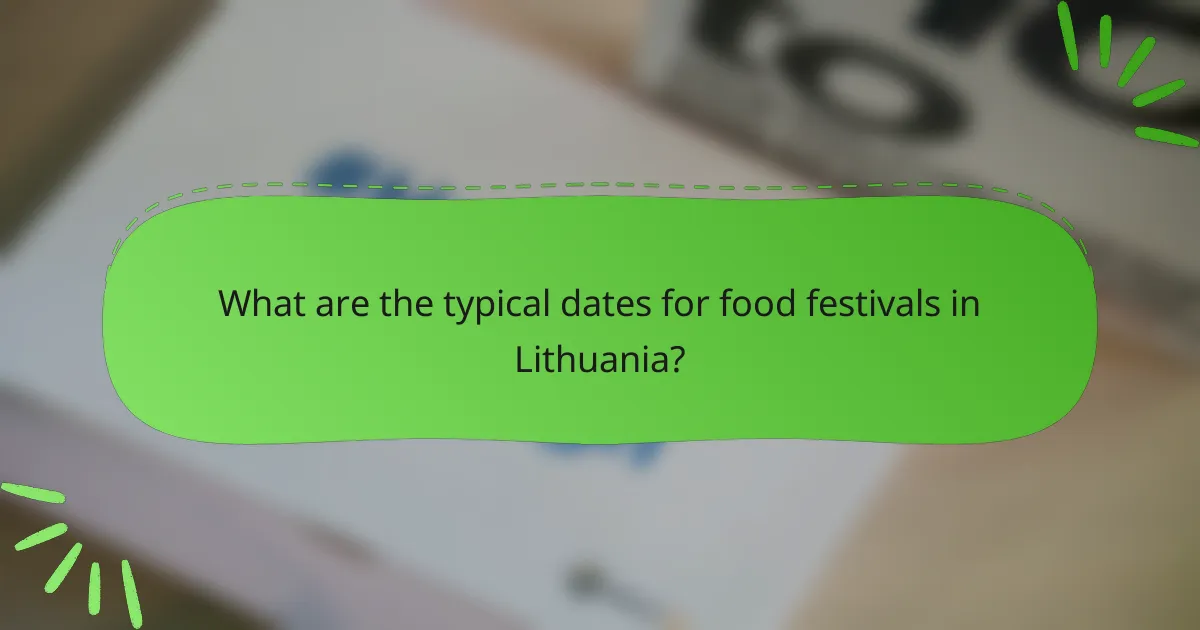
What are the typical dates for food festivals in Lithuania?
Food festivals in Lithuania typically occur throughout the year, with a concentration during the summer and autumn months. Key events are often scheduled from June to December, celebrating local flavors and seasonal produce.
Summer festivals from June to August
Summer is a vibrant time for food festivals in Lithuania, featuring a variety of events that highlight fresh produce and traditional dishes. Festivals such as the Vilnius Street Food Festival and the Kaunas Food Festival attract both locals and tourists, showcasing everything from artisanal cheeses to local craft beers.
These festivals often take place on weekends, providing a lively atmosphere with live music, cooking demonstrations, and opportunities to sample diverse culinary offerings. Attendees can expect to enjoy seasonal fruits and vegetables, as well as grilled meats and traditional pastries.
Autumn harvest festivals in September
September marks the beginning of the autumn harvest festivals in Lithuania, celebrating the bounty of local farms. Events like the Panevėžys Harvest Festival focus on showcasing the region’s agricultural products, including grains, vegetables, and homemade preserves.
These festivals often include competitions for the best produce, cooking contests, and workshops on traditional cooking methods. Visitors can immerse themselves in the local culture by tasting hearty autumn dishes and purchasing fresh ingredients directly from farmers.
Winter holiday food markets in December
In December, winter holiday food markets become a focal point for culinary experiences in Lithuania. Cities like Vilnius and Klaipėda host festive markets where visitors can enjoy traditional winter foods such as cepelinai (potato dumplings) and various spiced pastries.
These markets are typically open throughout the month and feature a cozy atmosphere with decorations and seasonal music. Attendees can warm up with mulled wine or hot chocolate while exploring stalls filled with handmade crafts and local delicacies, making it a perfect way to celebrate the holiday season.

What are the ticket prices for food festivals in Lithuania?
Ticket prices for food festivals in Lithuania can vary significantly based on the event type. Many festivals offer free entry, while others charge between €5 to €20 for general admission, with some featuring VIP packages for a premium experience.
Free entry festivals
Several food festivals in Lithuania allow visitors to enjoy local cuisine without any admission fee. These events often feature a variety of food stalls, cooking demonstrations, and cultural performances, making them accessible to everyone.
Examples of free entry festivals include the Vilnius Street Food Festival and the Kaunas Food Festival, where attendees can sample dishes from local vendors and experience the vibrant atmosphere without spending money on tickets.
Ticketed events ranging from €5 to €20
Many food festivals charge a modest fee for entry, typically ranging from €5 to €20. These ticketed events often provide additional features such as exclusive tastings, workshops, and live entertainment, enhancing the overall experience.
For instance, the Klaipeda Seafood Festival may charge around €10 for entry, which includes access to various seafood tastings and cooking classes. It’s advisable to purchase tickets in advance, as popular events can sell out quickly.
VIP packages for exclusive experiences
Some food festivals offer VIP packages that provide exclusive experiences for a higher price. These packages can range from €30 to €100 and may include perks like priority seating, private tastings, and meet-and-greet opportunities with chefs.
For example, the Vilnius Gourmet Festival often features VIP options that allow guests to enjoy a curated menu prepared by renowned chefs, along with complimentary drinks. Investing in a VIP package can significantly enhance the culinary experience at these festivals.
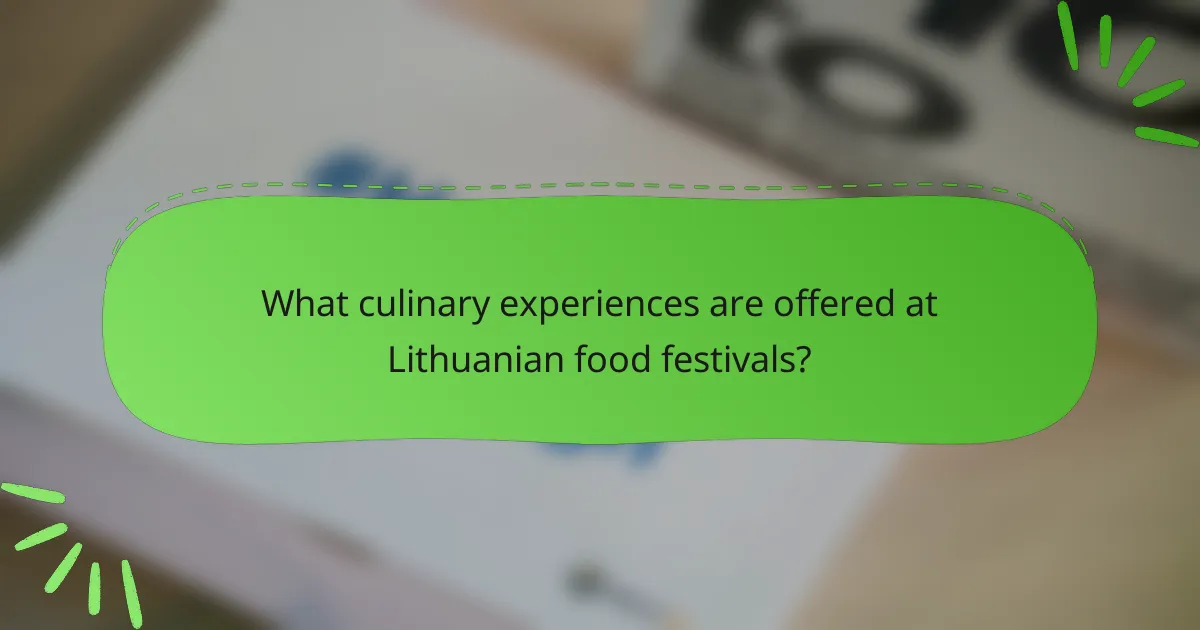
What culinary experiences are offered at Lithuanian food festivals?
Lithuanian food festivals showcase a variety of culinary experiences that highlight local flavors and traditional dishes. Visitors can expect to enjoy tastings, cooking demonstrations, and the opportunity to meet local chefs and producers, all celebrating Lithuania’s rich gastronomic heritage.
Traditional Lithuanian Dishes
Food festivals in Lithuania prominently feature traditional dishes such as cepelinai (potato dumplings filled with meat), šaltibarščiai (cold beet soup), and various types of rye bread. These dishes reflect the country’s agricultural roots and are often prepared using age-old recipes passed down through generations.
Attendees can sample these dishes at food stalls or participate in cooking workshops to learn how to prepare them at home. Many festivals also offer regional variations, allowing visitors to experience the diversity of Lithuanian cuisine.
Local Ingredients and Producers
Local food festivals emphasize the use of fresh, seasonal ingredients sourced from nearby farms. This not only supports local agriculture but also enhances the flavor and quality of the dishes served. Visitors can meet farmers and producers, gaining insight into the sourcing and preparation of their food.
Many festivals include markets where attendees can purchase local products such as cheeses, meats, and artisanal bread. This direct connection to producers fosters a deeper appreciation for the culinary landscape of Lithuania.
Culinary Workshops and Demonstrations
Culinary workshops and live cooking demonstrations are common at Lithuanian food festivals, providing hands-on experiences for participants. These sessions often focus on traditional cooking techniques and the preparation of iconic dishes.
Workshops cater to various skill levels, from beginners to advanced cooks, and typically last anywhere from one to three hours. Participants can learn valuable skills while enjoying the communal atmosphere of the festival.
Food Pairings and Tastings
Food pairings and tastings are integral to the festival experience, allowing attendees to explore how different flavors complement each other. Many festivals organize tasting sessions that feature local wines, beers, and spirits paired with traditional dishes.
These tastings often highlight the unique characteristics of Lithuanian beverages, such as mead and kvass, enhancing the overall culinary experience. Participants can gain insights into pairing techniques that can be applied in their own cooking.


